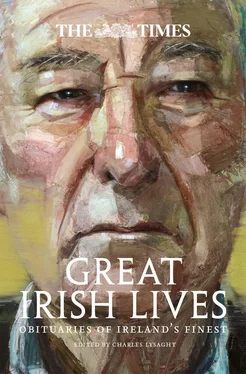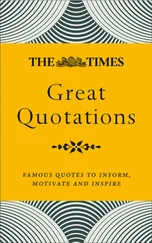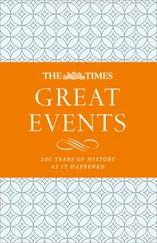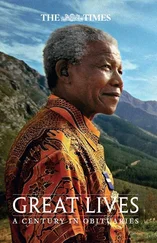I have sought to achieve a better gender balance than, for understandable reasons, was achieved in the actual obituaries in previous generations. I have also tried to represent a variety of spheres of Irish life, including in particular the arts, literature, business, sport, entertainment, science as well as the politicians, churchmen, lawyers, military men, public servants and academics that were preponderant in The Times obituaries of older vintage. In an earlier period other obituaries were often skimpy. In the case of the arts, literature and even science they were sometimes marred by an excessive preoccupation with the subject’s work to the exclusion of their life and personality and not couched in terms readily understood by the general reader.
I have included a number of largely forgotten figures who have never been the subject of a full biography or have not made it even into the Dictionary of National Biography , which is sketchy in its recent Irish coverage. In one or two cases I have felt inspired by the observation of Brendan Bracken in the tribute he contributed anonymously to The Times in 1928 about his mother that ‘one of the best services performed by The Times are the notices it publishes of gentle quiet lives which add much to the common stock but whose quality makes no appeal to the busy art of modern publicity.’
As the book celebrates links between The Times and Ireland, I have included a number of Irish persons who have worked for The Times beginning with William Howard Russell and culminating with William Casey, the editor from 1948 to 1952. In their different ways, their lives are illustrative of the infinite complexity of the British-Irish relationship.
I have felt deeply honoured by Ian Brunskill’s invitation to edit this volume. It is the culmination of a happy association with the obituaries department dating back to 1969, when I was a young law lecturer and barrister in London. I have prepared more than a century of obituaries over the years. From the early days when Colin Watson, Peter Davies and Juliet Lygon were in charge to more recent times when Peter Strafford, Tony Howard and Ian Brunskill were the obituaries editors, I have been the recipient of much encouragement and unfailing courtesy from those working in the obituaries department. For that I am truly grateful. I am also grateful to the librarians and archivists in the paper for sourcing obituaries. I like to think that coverage of deceased Irish persons by The Times contributes to the mutual comprehension between the people of our two islands which is much to be desired.
HENRY GRATTAN
6 JUNE 1820
WITH UNFEIGNED CONCERN we announce … the much-to-belamented death of the Right Hon. Henry Grattan. The dissolution of this intrepid patriot would have been a subject of deep regret to the empire at large, had not the decline of his intellectual as well as vital powers been more recently observed. To his own immediate countrymen it is a source of profound and even filial sorrow …
Mr Grattan came into Parliament about the year 1773. Towards the close of the American war he carried against both the English and Irish Government the repeal of those statutes which had given the British Parliament, and in some respects the Privy Council of England, an absolute control over the legislature of his native country. He has been since the year 1790 the strenuous, persevering, and powerful advocate for an entire abolition of the penal laws against the Catholics. This measure, in the separate Parliament of Ireland, he repeatedly declared to be essential to the complete deliverance of that country from the yoke of the British ministers, as, since the Union, he has, in the language of Mr Pitt, described Catholic emancipation to be a necessary step towards giving both countries the full benefit of that important measure. Mr Grattan has long laboured under dropsy of the chest. It is well known that he was conscious of his approaching dissolution; and that, when he devoted “his last breath to his country,” he was sensible that his appearance in Parliament, for the pious purpose of recommending to the House of Commons the cause so near his heart, must tend to accelerate that mournful sacrifice. His enfeebled frame did not second the aspirings of his bold and fervent spirit: he was doomed to bequeath emancipation as a legacy – not to bestow it as a gift.
Mr Grattan’s eloquence was peculiar and original. It resembled that of no speaker that we have ever heard. His voice was naturally feeble, but practice made it audible; and laborious effort, combined with a careful and studied articulation, rendered his high tones so piercing that none of them were lost. Mr Grattan had no wit, or rather, in Parliament, he did not exhibit any. He seldom discussed the details of any question, but fastened on a few of the leading principles, which he developed and illustrated with singular strength of language, and copious felicity of imagination. His sentences were full of antithesis; and, rather than lose that favourite structure of expression, he would build it up occasionally of common-place or even puerile matter. His arguments were frequently a string of epigrams. His retorts and personal invectives were distinguished by a keen and pithy sarcasm, which told upon every nerve of his ill-starred opponent. There was, nevertheless, an earnestness and solemnity, an innate and manifest consciousness of his own rectitude, about the man, which taught his hearers to respect and admire him when he most failed to convert them to the opinions of which he was the advocate. Mr Grattan, in society, was playful and simple as a child: irritable, perhaps, in a public assembly, he was elsewhere the very soul of courtesy, complacency, and cheerfulness.
Mr Grattan’s property consisted for the most part of the sum of 50,000 l , which had been tendered to him by his country, and it was honourably earned. He died at his house in Baker-street, Portman-square.
DANIEL O’CONNELL
24 MAY 1847
WE BELIEVE THERE is no doubt that Mr O’Connell expired on Saturday, the 15th of this month, at Genoa. He yielded up his latest breath at the distance of many hundred miles from the remains of the humble dwelling which became remarkable as his birthplace. In a remote part of the county of Kerry is a village called Cahirciveen, and within one mile of that obscure locality may be found a place bearing the name of Carhen. The latter was for many years the residence of Morgan O’Connell, father of the extraordinary man to an account of whose life and character these columns are assigned. In that most desolate region was Daniel O’Connell born, on the 6th of August, 1775 – a date which he was accustomed to notice with no small complacency, for he took much pleasure in reminding the world that he was born in the year during which our American colonies began to assert their independence, and he sometimes succeeded in persuading his admirers that that incident, taken in connexion with others, shadowed forth his destiny as a champion of freedom. Antecedently to his thirteenth year he received little instruction beyond what pedagogues of the humblest order are capable of imparting; but that class in Kerry are considerably superior to their brethren in other parts of Ireland, and upon the whole it could not be said that even his early education was by any means neglected. About this time his father’s pecuniary circumstances began evidently to improve; his uncle, the owner of Darrynane, though long married, had no issue; he declared Daniel O’Connell to be his favourite nephew, and therefore the friends of “the fortunate youth” thought that no expense should be spared upon the intellectual culture of one whose acknowledged talents and brightening prospects rendered him what is called “the hope of the family.” In those days the Irish members of the Church of Rome were just beginning to exercise a few of the privileges which they now most amply enjoy; and at a place called Redington, in Long Island, one of their priests, a Mr Harrington, had opened a school. Thither young Daniel O’Connell was sent in the year 1788, and there he remained for about 12 months, when he and his brother Maurice took leave of Mr Harrington, with the view of proceeding to one of the Roman Catholic seminaries on the continent. Their first destination was Louvain, but immediately on their reaching that place it was found that Daniel had passed the admissible age; he, however, attended the classes as a volunteer, till fresh instructions could arrive from Kerry. At the end of six weeks the O’Connells proceeded from Louvain to St Omer, and finally to the English College at Douay, where the subject of this memoir pursued his studies with much distinction. Before he quitted St Omer the President of that College, in a letter still preserved, ventured to foretell that his pupil was “destined to make a remarkable figure in society.” On the 21st of December, 1793, Mr O’Connell, being then in the 18th year of his age, quitted Douay, and reached England, without encountering any adventures, save those which sprang from the insults that the revolutionary party were accustomed to inflict upon every one whom they supposed to be an Englishman, or an ecclesiastic, or even a student of divinity. The scenes which he witnessed in France caused Mr O’Connell frequently to declare that in those days he was almost a Tory. He certainly was not then a revolutionist, for the moment he reached the English packet-boat he and his brother tore the tricolour cockades from their hats, and trampled them on the deck. Those sentiments, however, he did not long continue to cherish, for a year had not quite passed away when he exchanged them for doctrines which strongly savoured of Liberalism. It is understood that at a very early age he was intended for the priesthood. Those Irish Roman Catholics who evinced any aptitude for a learned profession found none other open to them in the days of O’Connell’s boyhood. But it is difficult to imagine any one more incapable than he was of maintaining even those outward signs of holiness which are generally observed by the ecclesiastics of his persuasion. An overflow of animal spirits rendered him, not merely a gay, but an obstreperous member of society, and his riotous jocularity acknowledged no limits. All idea, therefore, of his becoming a priest, if ever seriously entertained, must have been abandoned before he reached the age of 19, for he was then devoted to anything rather than the service of the altar. Hare hunting and fishing were amongst his darling pastimes; and these means of relaxation continued to fill his leisure hours, even when his years had approximated to three score and ten. From 17 to 70 the energy of his intellect and the ardour of his passions seemed to suffer no abatement. A large and well used law library, numerous liaisons , a pack of beagles, and a good collection of fishing tackle, attested the variety of his tastes and the vigour of his constitution. Before he had completed his 20th year he became a student of Lincoln’s-inn, into which society he was received on the 30th of January, 1794. Previous to the year 1793 Roman Catholics were not admitted to the bar, and Mr O’Connell was amongst the earliest members of that Church who became candidates for legal advancement. His entrance upon the profession of the law, as a barrister, took place on the 19th of May, 1798, and it must be acknowledged that he spared no pains to qualify himself for that arduous pursuit. Though of a joyous temperament, self-indulgent, and in some respects sensual, he still was not indisposed to hard labour, so that he became almost learned in the law before he ever held a brief. Conformably with the custom of the Irish bar, Mr O’Connell prepared himself for any sort of business that might come within his reach, whether civil or criminal – whether at common law or in equity. There are men in the Temple who would laugh to scorn the best specimens of his special pleading; and conveyancers in Lincoln’s-inn who hold very cheap his skill in their branch of the profession; but in 1798 there was no man of the same standing on the Munster circuit, or at the Irish bar, who knew more of his profession than young Mr O’Connell; and in a short time he became a very efficient lawyer of all-work. The sanguinary rebellion of that period was then at its height, and he probably cherished in his heart as much of the jacobinical principle as was consistent with the character of a thorough Roman Catholic. But he was a lawyer, and being also a shrewd politician, he foresaw that of those United Irishmen who escaped from the field many would be likely to perish on the scaffold; with great prudence, therefore, and most loyal valour, he joined the yeomanry and supported the Government. Again, when it became necessary to reorganize a yeomanry force in 1803, he once more took his place in “the Lawyers’ Corps.” Many anecdotes have been at various times retailed, showing the pains which he took to mitigate the atrocities of that period; and, however indifferent he might be as to the remote tendency of his political proceedings, he certainly manifested throughout his life a strong aversion to actual deeds of blood.
Читать дальше












